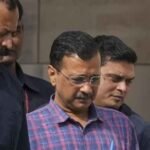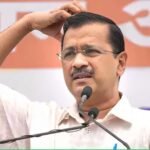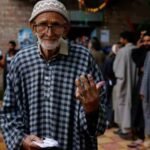In a dramatic escalation of political rhetoric, Delhi Chief Minister Arvind Kejriwal recently made a startling allegation, claiming that the Bharatiya Janata Party (BJP) is plotting to assassinate him. Speaking at a public event, the Aam Aadmi Party (AAP) leader accused the ruling national party of targeting him due to his political stances and his party’s growing popularity across India. The claims have sent shockwaves through the political landscape, prompting sharp reactions from both the BJP and opposition parties.

This development marks a new phase of confrontation between AAP and BJP, as India approaches crucial state elections, with the 2024 General Elections also looming on the horizon. Kejriwal’s allegation is a reflection of the deepening divide and growing tension in Indian politics. This article examines the statement made by Arvind Kejriwal, the political response to his claim, historical context, and potential implications for the future of Indian politics.
Arvind Kejriwal’s Allegations: “BJP Wants to Kill Me”
During a public meeting in Delhi, Arvind Kejriwal did not hold back in his accusations. Addressing a crowd of supporters, the Delhi CM stated, “The BJP wants to kill me. They see AAP as a threat to their political hegemony, and they will stop at nothing to remove that threat, even if it means taking my life.” Kejriwal also suggested that his political and administrative success in Delhi, particularly his government’s work in education, healthcare, and infrastructure, had made him a target.
This is not the first time Kejriwal has expressed fears for his safety. In the past, he has raised concerns over his security, citing incidents where he was attacked or faced threats. However, this is the first time he has directly accused a major political party of orchestrating a plot to assassinate him. The Delhi Chief Minister also linked the alleged threat to his broader criticism of the BJP, particularly its handling of economic issues, communal harmony, and governance.
Political Reactions: Sharp Responses from Across the Spectrum
Kejriwal’s accusations have sparked a flurry of political responses, with leaders across the spectrum weighing in on the matter. The BJP was quick to dismiss the claims as baseless and politically motivated. A senior BJP leader responded, “Arvind Kejriwal is known for making outrageous statements to gain public sympathy. His claims are a desperate attempt to divert attention from his own failures as a chief minister. The BJP does not engage in such activities, and these accusations are completely unfounded.”
The BJP has also called for evidence to back up Kejriwal’s claim, urging the Delhi CM to provide proof if there are genuine threats to his life. Some party officials have accused Kejriwal of trying to “play the victim card” ahead of elections, aiming to consolidate support among his voter base.
Meanwhile, other political parties have reacted cautiously. Leaders from the Congress Party, the main opposition at the national level, have condemned any threats of violence but have also refrained from taking a clear stand on Kejriwal’s allegations. One senior Congress leader remarked, “We do not support any kind of violence or intimidation in politics. However, such serious accusations should be backed by concrete evidence, and we advise Kejriwal to approach the authorities if he genuinely feels threatened.”
AAP’s Defence: “The Allegations Are Not Baseless”
Members of the Aam Aadmi Party have come out strongly in defense of their leader, asserting that Kejriwal’s concerns are valid and that there have been repeated attempts to intimidate him. Senior AAP officials have pointed out past incidents where Kejriwal was physically assaulted during public appearances. In 2019, he was slapped by an individual while campaigning in Delhi, an incident that his party then described as a deliberate attack orchestrated by political opponents.
AAP leaders argue that Kejriwal’s popularity and growing national presence have made him a target, especially as the party has successfully expanded beyond Delhi. From winning the Punjab Assembly elections to making inroads in states like Goa, Gujarat, and Karnataka, AAP’s growing influence is seen as a challenge to the BJP’s dominance. “It is not just about Delhi anymore. The BJP is scared of AAP’s rise, and they will go to any lengths to suppress us,” said an AAP spokesperson.
Historical Context: Political Threats and Violence in Indian Politics
Political threats, accusations, and even violence are not new to Indian politics. Over the years, several political figures have faced security threats, with some tragic incidents leading to assassinations. The assassinations of Indira Gandhi in 1984 and Rajiv Gandhi in 1991 are stark reminders of the dangers that politicians in India sometimes face. However, accusations of assassination plots by a major political party against a sitting chief minister are rare and have elevated the stakes of political discourse to a dangerous level.
Kejriwal’s allegation also brings to light the larger issue of political safety and the kind of threats public figures face. Security arrangements for prominent leaders are usually handled by state and central agencies, and any credible threat assessment often leads to the provision of extra security. With this latest accusation, questions are being raised about the effectiveness of security agencies and whether there are gaps that need addressing.
Implications for Future Elections: Strategy or Genuine Concern?
With state elections scheduled in several key states and the 2024 General Elections approaching, political analysts are debating the possible motivations behind Kejriwal’s statements. Some believe that Kejriwal’s remarks could be a strategic move to garner public sympathy, particularly among voters who see him as a champion of the common man standing against a powerful political machine. By portraying himself as a victim of political vendetta, Kejriwal may be aiming to mobilize support and unify his base.
Others, however, argue that Kejriwal’s allegations might be grounded in genuine concern. The political environment in India has become highly polarized, and threats against politicians are not unheard of. Given the rising tensions and incidents of political violence in recent years, there is a possibility that Kejriwal’s fears are based on actual threats that need to be taken seriously.
Security Measures and Government Responsibility
Following Kejriwal’s statement, there have been calls for a thorough investigation into the matter. If there is any credibility to the allegations, it is the responsibility of law enforcement and security agencies to ensure that Kejriwal’s safety is not compromised. The Delhi Police, which operates under the Union Home Ministry, has stated that they are reviewing the situation and will take appropriate measures.
Political figures, regardless of their affiliations, are public servants, and their security is paramount. Authorities have been urged to assess the situation objectively and take necessary actions to prevent any untoward incident. The Home Ministry may also be prompted to reevaluate the security arrangements for other prominent political leaders, especially in the run-up to the elections.
Broader Political Ramifications: Deepening Divides
The fallout from Kejriwal’s accusations is likely to deepen the existing divides between the AAP and BJP. Over the years, the two parties have engaged in numerous confrontations, with AAP positioning itself as a party for the people, challenging what it calls the “political monopoly” of the BJP. Kejriwal’s recent statements have only added to the acrimony, and the coming months could see a further escalation in political rhetoric.
From allegations of misuse of central agencies like the Enforcement Directorate (ED) and the Central Bureau of Investigation (CBI) to disputes over governance models in Delhi, AAP and BJP have clashed on multiple fronts. The assassination allegation adds a new dimension to the political rivalry, potentially setting the stage for a heated and bitter election campaign.
Conclusion
The allegation by Arvind Kejriwal that the BJP is plotting to assassinate him has added a new and troubling dimension to Indian politics. Whether seen as a political strategy or a genuine expression of concern, the statement has raised critical questions about the state of political discourse, security for public figures, and the nature of political rivalry in India.
For now, the ball is in the court of law enforcement agencies to address these allegations responsibly. Political analysts will be closely watching how this development unfolds, especially with the upcoming elections that could redefine the political landscape in India. The need for a calm, responsible, and measured approach from all political stakeholders has never been more urgent, as tensions continue to simmer in a highly polarized environment.
References:
- Statements from Arvind Kejriwal’s public speeches.
- Responses from BJP leaders and AAP spokespersons.
- Historical data on political violence and security measures in India.
- Insights from political analysts on the strategic implications of recent developments.








